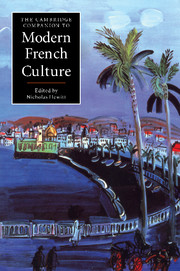Book contents
- Frontmatter
- Introduction: French culture and society in the twentieth century
- 1 Modern France: history, culture and identity, 1900-1945
- 2 Culture and identity in postwar France
- 3 Architecture, planning and design
- 4 The mass media
- 5 Consumer culture: food, drink and fashion
- 6 Language: divisions and debates
- 7 Intellectuals
- 8 Religion, politics and culture in France
- 9 The third term: literature between philosophy and critical theory
- 10 Narrative fiction in French
- 11 Poetry
- 12 Theatre
- 13 Music
- 14 The visual arts
- 15 Cinema
- Index
9 - The third term: literature between philosophy and critical theory
Published online by Cambridge University Press: 28 May 2006
- Frontmatter
- Introduction: French culture and society in the twentieth century
- 1 Modern France: history, culture and identity, 1900-1945
- 2 Culture and identity in postwar France
- 3 Architecture, planning and design
- 4 The mass media
- 5 Consumer culture: food, drink and fashion
- 6 Language: divisions and debates
- 7 Intellectuals
- 8 Religion, politics and culture in France
- 9 The third term: literature between philosophy and critical theory
- 10 Narrative fiction in French
- 11 Poetry
- 12 Theatre
- 13 Music
- 14 The visual arts
- 15 Cinema
- Index
Summary
Introduction
In 1948, the philosopher and rising star of Parisian existentialism, Jean- Paul Sartre, recast a series of essays into book form as Qu'est-ce que la littérature? (What is Literature?) The question Sartre raised in the title introduced a set of concerns he deemed central to the programme of committed writing (litte rature engagée) he and his colleagues sought to implement through the literary monthly, Les Temps modernes, they had launched in October 1945. Sartre's postwar ambitions for philosophy and literature were pragmatic and activist. Above all, he sought to mobilise the writer into an historical agent, a 'bad conscience' who spoke out in public - as often in speech as in writing - on the social and political issues of the moment. But while Qu'est-ce que la littérature? was a manifesto for littérature engagée, Sartre also saw the need to ground his programme in terms that addressed the nature of literature and of literary activity: what literature was, so to speak, aswell as what he wanted it to do. It was, then, no small irony that much as Sartre sought to mobilise the writer of prose within a broad public sphere represented by mass media such as the daily press, theatre, film, the foundational questions he addressed in the opening chapters of Qu'est-ce que la litté rature? - what is writing? why write? for whom does one write? - drew openly on a philosophical tradition whose origins in Greek antiquity included Aristotle's Poetics and Plato's Republic.
- Type
- Chapter
- Information
- The Cambridge Companion to Modern French Culture , pp. 187 - 204Publisher: Cambridge University PressPrint publication year: 2003

